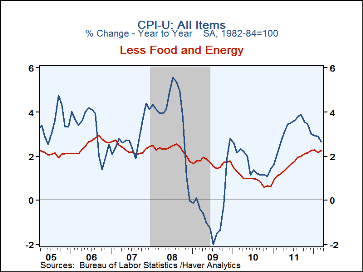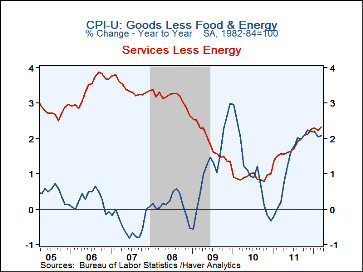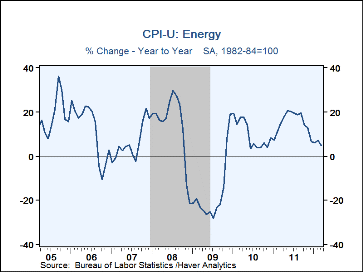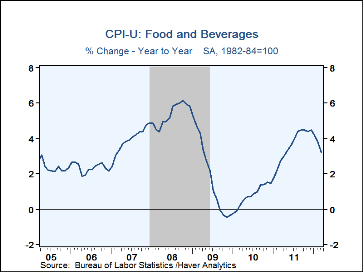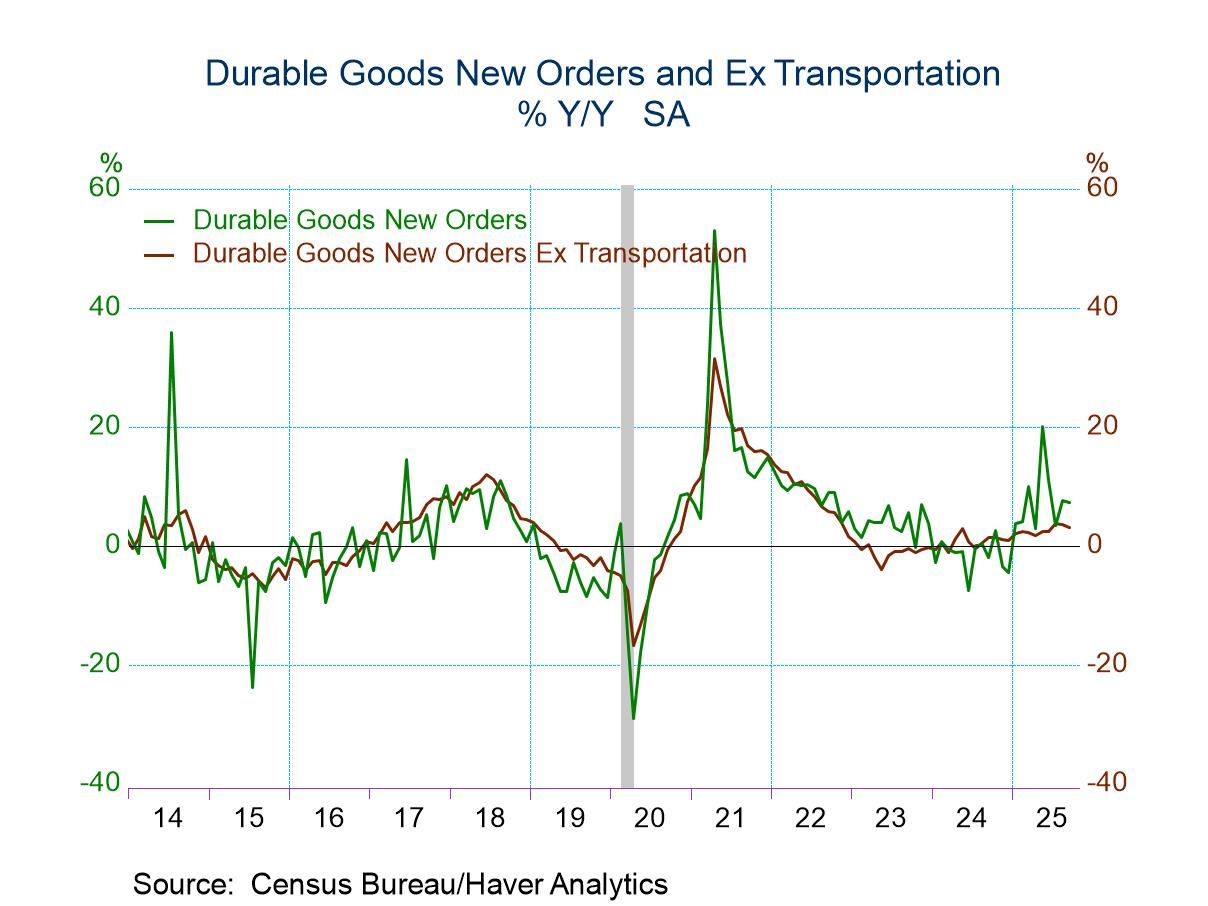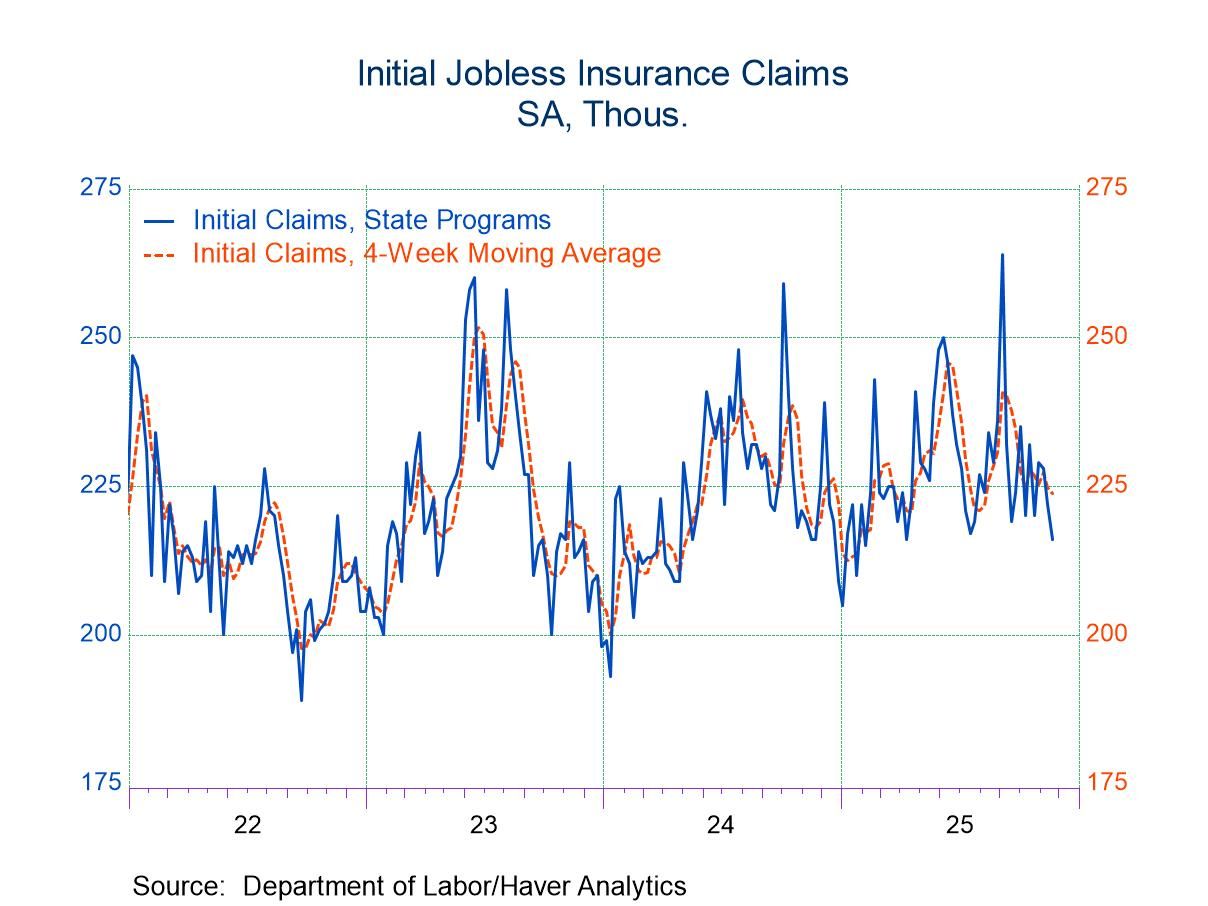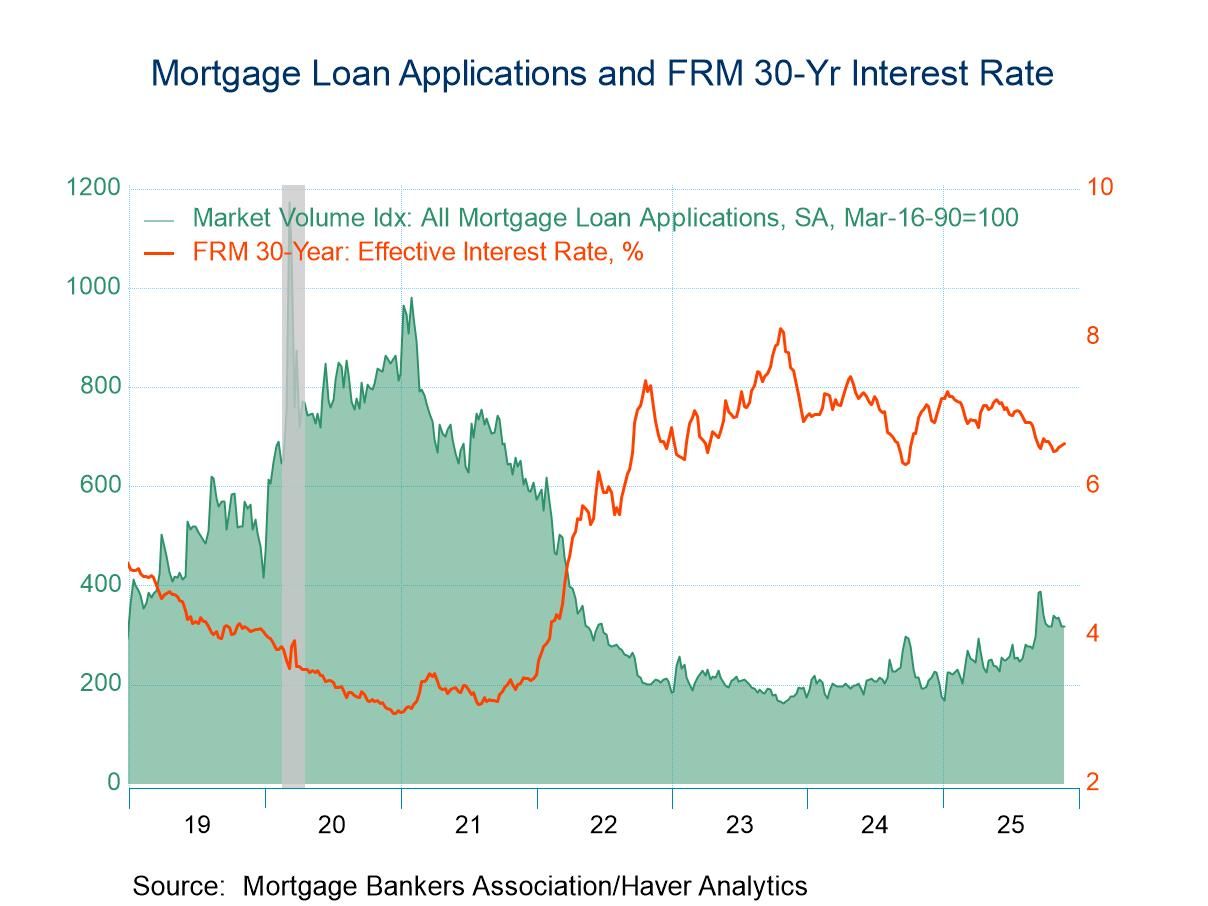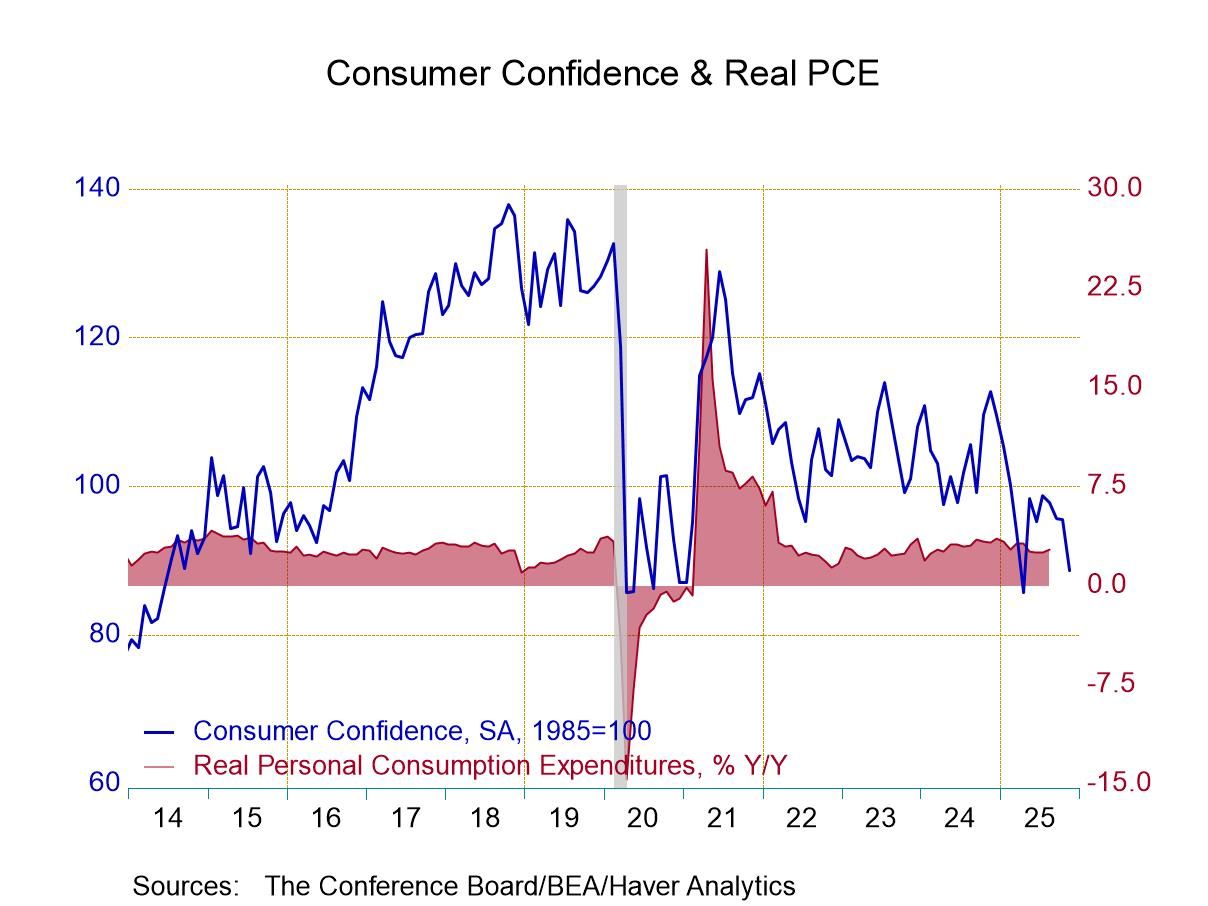 Global| Apr 13 2012
Global| Apr 13 2012U.S. Overall CPI Gain Eases; Core Rate Firms
by:Tom Moeller
|in:Economy in Brief
Summary
Consumer prices rose a moderate and expected 0.3% last month, down from February's unrevised 0.4% gain. The increase left the y/y increase of 2.6% down from its peak of 3.9% six months ago. Prices less food and energy increased 0.2%, [...]
Consumer prices rose a moderate and expected 0.3% last month, down from February's unrevised 0.4% gain. The increase left the y/y increase of 2.6% down from its peak of 3.9% six months ago. Prices less food and energy increased 0.2%, also as-expected. However, the rise pulled the y/y rate of gain to 2.3% which equaled its highest since September 2008.
Energy prices increased a moderated 0.9% (4.5% y/y) as gasoline prices increased 1.7% (9.0% y/y). Fuel oil costs rose a not seasonally adjusted 1.8% (4.3% y/y) but gas & electricity prices fell again by 0.4% (-1.8% y/y).
Food & beverage prices in March edged up again by 0.1% (3.2% y/y) as strength continued in prices of meats (5.3% y/y). Elsewhere, gains moderated with cereals & bakery products increasing 4.5% y/y and fruits & vegetables falling 3.7% y/y.
For goods alone, prices less food & energy have been firming. They rose 0.2% last month and the 12-month increase of 2.1% was up from a 0.3% decline late in 2010. Apparel prices rose 0.5% and the 4.9% y/y gain was up versus the 0.5% decline in 2010. Furniture & operations costs fell 0.2% (1.1% y/y) after two years when prices fell. Motor vehicle prices increased 0.6% (2.1% y/y).
The increase in core service prices of 0.2% (2.3% y/y) reflected a 0.2% rise (2.1% y/y) in shelter costs (32% of the CPI). Owners equivalent rent of primary residences also rose 0.2% (2.0% y/y). The y/y increase compares to a low of -0.3% in early 2010. Education costs rose for the fourth straight month by 0.3% (4.4% y/y) and medical care service prices rose a quickened 0.3% (3.5% y/y). Public transportation prices increased 0.5% (-0.3% y/y) after four months of decline. Recreation services costs rose 0.2% (1.2% y/y).
The chained CPI, which adjusts for shifts in consumption patterns, rose a firmer 0.6% last month (2.4% y/y). Chained prices less food & energy rose 0.4% and by 2.1% y/y.
The consumer price data is available in Haver's USECON database while detailed figures can be found in CPIDATA. The expectations figure is from Action Economics and is found in the AS1REPNA database.
Some Reflections on the Crisis and the Policy Response is today's speech by Fed Chairman Ben S. Bernanke and it can be found here.
| Consumer Price Index (%) | Mar | Feb | Jan | Mar Y/Y | 2011 | 2010 | 2009 |
|---|---|---|---|---|---|---|---|
| Total | 0.3 | 0.4 | 0.2 | 2.6 | 3.1 | 1.6 | -0.3 |
| Total less Food & Energy | 0.2 | 0.1 | 0.2 | 2.3 | 1.7 | 1.0 | 1.7 |
| Goods less Food & Energy | 0.2 | 0.1 | 0.2 | 2.1 | 1.3 | 1.1 | 1.3 |
| Services less Energy | 0.2 | 0.1 | 0.2 | 2.3 | 1.8 | 0.9 | 1.9 |
| Food & Beverages | 0.1 | 0.1 | 0.2 | 3.2 | 3.6 | 0.8 | 1.9 |
| Energy | 0.9 | 3.2 | 0.2 | 4.5 | 15.2 | 9.6 | -18.2 |
| Chained CPI: Total (NSA) | 0.6 | 0.4 | 0.4 | 2.4 | 2.8 | 1.4 | -0.5 |
| Total less Food & Energy | 0.4 | 0.3 | 0.2 | 2.1 | 1.5 | 0.7 | 1.5 |
Tom Moeller
AuthorMore in Author Profile »Prior to joining Haver Analytics in 2000, Mr. Moeller worked as the Economist at Chancellor Capital Management from 1985 to 1999. There, he developed comprehensive economic forecasts and interpreted economic data for equity and fixed income portfolio managers. Also at Chancellor, Mr. Moeller worked as an equity analyst and was responsible for researching and rating companies in the economically sensitive automobile and housing industries for investment in Chancellor’s equity portfolio. Prior to joining Chancellor, Mr. Moeller was an Economist at Citibank from 1979 to 1984. He also analyzed pricing behavior in the metals industry for the Council on Wage and Price Stability in Washington, D.C. In 1999, Mr. Moeller received the award for most accurate forecast from the Forecasters' Club of New York. From 1990 to 1992 he was President of the New York Association for Business Economists. Mr. Moeller earned an M.B.A. in Finance from Fordham University, where he graduated in 1987. He holds a Bachelor of Arts in Economics from George Washington University.


